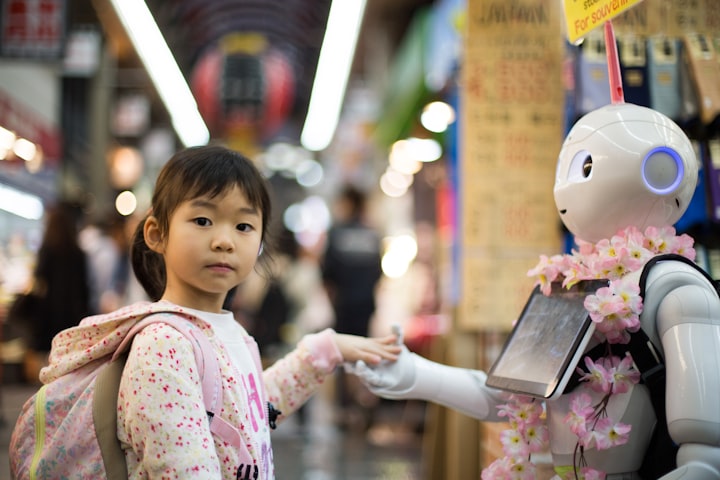The Relationship Between AI and Human Intelligence
Collaboration, Competition, and Ethics

Artificial Intelligence (AI) and human intelligence are two distinct forms of cognitive intelligence. While human intelligence is organic and natural, AI is machine-based and designed to mimic human intelligence. The advent of AI has caused a significant shift in the way we think about intelligence and its potential applications in various fields. In this essay, we will explore the differences and similarities between AI and human intelligence.
One of the most significant differences between AI and human intelligence is their origin. Human intelligence is an innate ability that we are born with, while AI is created by humans through computer programming and engineering. The human brain is incredibly complex and has evolved over millions of years to be able to perform a wide range of tasks, from problem-solving to creative expression. On the other hand, AI is created to perform specific tasks, such as language translation, image recognition, and decision-making.
Another significant difference between AI and human intelligence is their approach to problem-solving. Human intelligence is based on a combination of deductive and inductive reasoning, which allows us to analyze data, identify patterns, and draw conclusions based on past experiences. AI, on the other hand, relies on machine learning algorithms that can process vast amounts of data and identify patterns that may not be apparent to humans.
One of the key advantages of AI over human intelligence is its ability to perform repetitive tasks without fatigue or error. For example, an AI system can process and analyze large data sets in a matter of minutes, whereas a human analyst would take hours or even days to complete the same task. This makes AI particularly useful in fields such as finance, healthcare, and manufacturing, where accuracy and speed are critical.
However, while AI may be superior to humans in certain areas, it has several limitations that prevent it from fully replacing human intelligence. For example, AI lacks the emotional intelligence and creativity that humans possess. Human intelligence allows us to empathize with others, understand complex emotions, and create original works of art and literature. These are qualities that are difficult, if not impossible, to replicate in AI.
Another limitation of AI is its inability to understand context and ambiguity. While AI can process vast amounts of data, it may struggle to understand the nuances of language or cultural context, which can lead to errors in communication and decision-making. Humans, on the other hand, have the ability to interpret context and make decisions based on a wide range of factors beyond data analysis.
Despite these limitations, AI is rapidly advancing and has the potential to revolutionize numerous fields, from healthcare to transportation to finance. However, as AI continues to evolve, it is important to consider its ethical implications and ensure that it is used responsibly and ethically.
In conclusion, while AI and human intelligence are distinct forms of cognitive intelligence, they each have their strengths and weaknesses. AI is superior to humans in certain areas, such as data processing and analysis, but it lacks the emotional intelligence and creativity that humans possess. As AI continues to advance, it is important to consider its potential applications and limitations, and ensure that it is used responsibly and ethically to benefit society as a whole.
Is AI competent with humans?
While AI and human intelligence can perform similar tasks, they are not necessarily in competition with each other. AI is designed to enhance and augment human intelligence, not to replace it. AI systems can assist humans in performing tasks more efficiently, accurately, and quickly, but they lack the emotional intelligence, creativity, and intuition that humans possess.
In some cases, AI and humans may work together collaboratively to achieve a common goal. For example, in medical diagnosis, an AI system may analyze medical imaging data and identify potential areas of concern, but ultimately, a human doctor will use their medical knowledge and experience to make the final diagnosis and treatment plan.
Furthermore, AI and human intelligence can excel in different areas. For example, AI is better suited for tasks that require data processing and analysis, while human intelligence is better suited for tasks that require creativity, empathy, and intuition. Therefore, rather than competing with each other, AI and human intelligence can complement each other and work together to achieve common goals.
However, it is important to acknowledge that as AI continues to advance, it may eventually be able to perform tasks that were previously thought to be uniquely human, such as creative expression and emotional intelligence. This raises important ethical questions about the role of AI in society and the potential impact on human employment and well-being. Therefore, it is essential to approach the development and implementation of AI with caution, and to ensure that it is used in a responsible and ethical manner that benefits society as a whole.
About the Creator
Ashok kumar
Amateur storyteller, you can expect me from all genres and also All sorts of stories: some funny, some sad, some a little motivational all of them told from the heart.
Thank you all for your support.






Comments
There are no comments for this story
Be the first to respond and start the conversation.